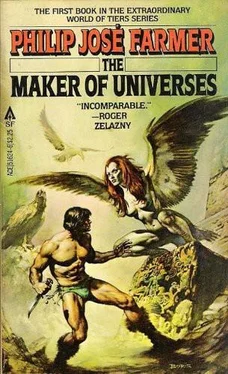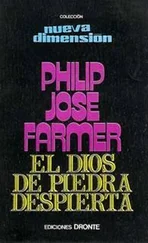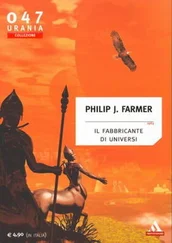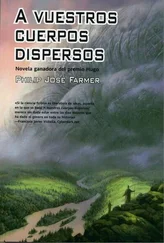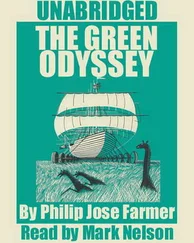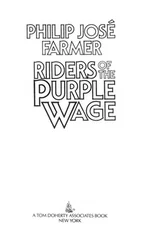He began walking along the rim, Wolff with him.
“Observe how green and lush the grass is and how it is as high as our knees, Bob. It affords pasture for browsers and grazers. But it is also high enough to conceal the beasts that feed on the grass-eaters. So beware! The plains puma and the dire wolf and the striped hunting dog and the giant weasel prowl through the grasses. Then there is Felis Atrox, whom I call the atrocious lion. He once roamed the plains of the North American Southwest, became extinct there about 10,000 years ago. He’s very much alive here, one-third larger than the African lion and twice as nasty.
“Hey, look there! Mammoths!”
Wolff wanted to stop to watch the huge gray beasts, which were about a quarter of a mile away. But Kickaha urged him on. “There’re plenty more around, and there’ll be times when you wish there weren’t. Spend your time watching the grass. If it moves contrary to the wind, tell me.”
They walked swiftly for two miles. During this time, they came close to a band of wild horses. The stallions whickered and raced up to investigate them, then stood their ground, pawing and snorting, until the two had passed. They were magnificent animals, tall, sleek, and black or glossy red or spotted white and black.
“Nothing of your Indian pony there,” Kickaha said. “I think the Lord imported nothing but the best stock.”
Presently, Kickaha stopped by a pile of rocks. “My marker,” he said. He walked straight inward across the plain from the cairn. After a mile they came to a tall tree. The youth leaped up, grabbed the lowest branch, and began climbing. Halfway up, he reached a hollow and brought out a large bag. On returning, Kickaha took out of the bag two bows, two quivers of arrows, a deerskin breechcloth, and a belt with a skin scabbard in which was a long steel knife.
Wolff put on the loincloth and belt and took the bow and quiver.
“You know how to use these?” Kickaha said.
“I’ve practised all my life.”
“Good. You’ll get more than one chance to put your skill to the test. Let’s go. We’ve many a mile to cover.”
They began wolf-trotting: run a hundred steps, walk a hundred steps. Kickaha pointed to the range of mountains to their right.
“There is where my tribe, the Hrowakas, the Bear People, live. Eighty miles away. Once we get there, we can take it easy for awhile, and make preparations for the long journey ahead of us.”
“You don’t look like an Indian,” Wolff said.
“And you, my friend, don’t look like a sixty-six-year-old man, either. But here we are. Okay. I’ve put off telling my story because I wanted to hear yours first. Tonight I’ll talk.”
They did not speak much more that day. Wolff exclaimed now and then at the animals he saw. There were great herds of bison, dark, shaggy, bearded, and far larger than their cousins of Earth. There were other herds of horses and a creature that looked like the prototype of the camel. More mammoths and then a family of steppe mastodons. A pack of six dire wolves raced alongside the two for awhile at a distance of a hundred yards. These stood almost as high as Wolff’s shoulder.
Kickaha, seeing Wolff’s alarm, laughed and said, “They won’t attack us unless they’re hungry. That isn’t very likely with all the game around here. They’re just curious.”
Presently, the giant wolves curved away, their speed increasing as they flushed some striped antelopes out of a grove of trees.
“This is North America as it was a long time before the white man,” Kickaha said, “Fresh, spacious, with a multitude of animals and a few tribes roaming around.”
A flock of a hundred ducks flew overhead, honking. Out of the green sky, a hawk fell, struck with a thud, and the flock was minus one comrade. “The Happy Hunting Ground!” Kickaha cried. “Only it’s not so happy sometimes.”
Several hours before the sun went around the mountain, they stopped by a small lake. Kickaha found the tree in which he had built a platform.
“We’ll sleep here tonight, taking turns on watch. About the only animal that might attack us in the tree is the giant weasel, but he’s enough to worry about. Besides, and worse, there could be war parties.”
Kickaha left with his bow in hand and returned in fifteen minutes with a large buck rabbit. Wolff had started a small fire with little smoke; over this they roasted the rabbit. While they ate, Kickaha explained the topography of the country.
“Whatever else you can say about the Lord, you can’t deny he did a good job of designing this world. You take this level, Amerindia. It’s not really flat. It has a series of slight curves each about 160 miles long. These allow the water to run off, creeks and rivers and lakes to form. There’s no snow anywhere on the planet—can’t be, with no seasons and a fairly uniform climate. But it rains every day—the clouds come in from space somewhere.”
They finished eating the rabbit and covered the fire. Wolff took first watch. Kickaha talked all through Wolff’s turn at guard. And Wolff stayed awake through Kickaha’s watch to listen.
In the beginning, a long time ago, more than 20,000 years, the Lords had dwelt in a universe parallel to Earth’s. They were not known as the Lords then. There were not very many of them at that time, for they were the survivors of a millenia-long struggle with another species. They numbered perhaps ten thousand in all.
“But what they lacked in quantity they more than possessed in quality,” Kickaha said. “They had a science and technology that makes ours, Earth’s, look like the wisdom of Tasmanian aborigines. They were able to construct these private universes. And they did.
“At first each universe was a sort of playground, a microcosmic country club for small groups. Then, as was inevitable, since these people were human beings no matter how godlike in their powers, they quarreled. The feeling of property was, is, as strong in them as in us. There was a struggle among them. I suppose there were also deaths from accident and suicide. Also, the isolation and loneliness of the Lords made them megalomaniacs, natural when you consider that each played the part of a little god and came to believe in his role.
“To compress an eons-long story into a few words, the Lord who built this particular universe eventually found himself alone. Jadawin was his name, and he did not even have a mate of his own kind. He did not want one. Why should he share this world with an equal, when he could be a Zeus with a million Europas, with the loveliest of Ledas?
“He had populated this world with beings abducted from other universes, mainly Earth’s, or created in the laboratories in the palace on top of the highest tier. He had created divine beauties and exotic monsters as he wished.
“The only trouble was, the Lords were not content to rule over just one universe. They began to covet the worlds of the others. And so the struggle was continued. They erected nearly impregnable defenses and conceived almost invincible offenses. The battle became a deadly game. This fatal play was inevitable, when you consider that boredom and ennui were enemies the Lords could not keep away. When you are near-omnipotent, and your creatures are too lowly and weak to interest you forever, what thrill is there besides risking your immortality against another immortal?”
“But how did you come into this?” Wolff said.
“I? My name on Earth was Paul Janus Finnegan. My middle name was my mother’s family name. As you know, it also happens to be that of the Latin god of gates and of the old and new year, the god with two faces, one looking ahead and one looking behind.”
Kickaha grinned and said, “Janus is very appropriate, don’t you think? I am a man of two worlds, and I came through the gate between. Not that I have ever returned to Earth or want to. I’ve had adventures and I’ve gained a stature here I never could have had on that grimy old globe. Kickaha isn’t my only name, and I’m a chief on this tier and a big shot of sorts on other tiers. As you will find out.”
Читать дальше
